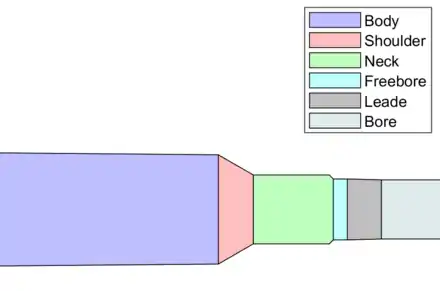Freebore
In firearms, freebore (also free-bore, free bore, or throat) is the portion of the gun barrel between the chamber and the rifled section of the barrel bore. The freebore is located just forward of the chamber neck and is usually cylindrical in shape.[1][2] The diameter of the freebore is always larger than the groove diameter of the gun barrel bore so that no rifling is present and projectiles used in the firearm can accelerate in the freebore without resistance.[3]

Location and dimensions

The chamber is the rearmost portion of a firearm barrel that has been formed to accept a specific cartridge or shell.[4] For firearms having a rifled barrel, the bullet typically extends forward from the leading edge of the cartridge. The portion of the barrel forward of the chamber that provides clearance for the loaded bullet of a cartridge is known as the throat. The throat is composed of both a freebore and a leade.[5] The freebore is typically slightly larger in diameter than the rifling grooves in order to allow the cartridge to be loaded into the chamber without resistance. The leade is the tapered section of the throat that transitions in diameter from the freebore to the rifling lands at a small angle, typically between 1 and 3 degrees.
Freebore length affects the distance the bullet will jump before engaging the rifling when the weapon is fired. Greater freebore length permits bullets to extend further out of the cartridge case to increase space for propellant within the case.[6] Increasing freebore length in order to increase bullet jump is used to delay the onset of resistance from friction and deformation that results when the bullet engages the rifling.[7] Dimensions of freebore length and diameter may gradually increase as hot gas wears the interior barrel surface each time the weapon is fired.
Sources
- Zwoll, Wayne van (2011-06-01). Shooter's Bible Guide to Rifle Ballistics. Simon and Schuster. ISBN 978-1-62087-285-7.
- Boddington, Craig (1999). Make It Accurate: Get the Maximum Performance from Your Hunting Rifle. Safari Press. ISBN 978-1-57157-150-2.
- "Glossary – SAAMI". Retrieved 2019-05-05.
- Walker, Robert E. (2013-03-21). Cartridges and Firearm Identification. CRC Press. ISBN 978-1-4665-8881-3.
- Withers, John (March 1986). Precision Handloading. Stoeger Publishing Company. ISBN 978-0-88317-132-5.
- Mann, Richard. "OAL and Free-Bore". Wolfe Publishing Company. Retrieved 21 June 2018.
- Nonte, George C. Jr. (2010-12-22). Pistolsmithing. Stackpole Books. ISBN 978-0-8117-4435-5.